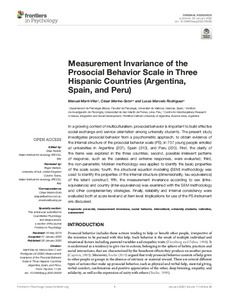Por favor, use este identificador para citar o enlazar este ítem:
https://repositorio.uca.edu.ar/handle/123456789/9941| Campo DC | Valor | Lengua/Idioma |
|---|---|---|
| dc.contributor.author | Martí-Vilar, Manuel | es |
| dc.contributor.author | Merino-Soto, César | es |
| dc.contributor.author | Rodríguez, Lucas Marcelo | es |
| dc.date.accessioned | 2020-05-11T18:21:42Z | - |
| dc.date.available | 2020-05-11T18:21:42Z | - |
| dc.date.issued | 2020 | - |
| dc.identifier.citation | Martí-Vilar, M., Merino-Soto, C., Rodríguez, L.M. Measurement invariance of the Prosocial Behavior Scale in three hispanic countries (Argentina, Spain, and Peru) [en línea]. Frontiers in Psychology. 2020, 11. doi:10.3389/fpsyg.2020.00029 Disponible en: https://repositorio.uca.edu.ar/handle/123456789/9941 | es |
| dc.identifier.issn | 1664-1078 | - |
| dc.identifier.uri | https://repositorio.uca.edu.ar/handle/123456789/9941 | - |
| dc.description.abstract | Abstract: In a growing context of multiculturalism, prosocial behavior is important to build effective social exchange and service orientation among university students. The present study investigates prosocial behavior from a psychometric approach, to obtain evidence of the internal structure of the prosocial behavior scale (PS), in 737 young people enrolled at universities in Argentina (207), Spain (310), and Peru (220). First, the clarity of the items was explored in the three countries; second, possible irrelevant patterns of response, such as the careless and extreme responses, were evaluated; third, the non-parametric Mokken methodology was applied to identify the basic properties of the scale score; fourth, the structural equation modeling (SEM) methodology was used to identify the properties of the internal structure (dimensionality, tau-equivalence) of the latent construct; fifth, the measurement invariance according to sex (intra-equivalence) and country (inter-equivalence) was examined with the SEM methodology and other complementary strategies. Finally, reliability and internal consistency were evaluated both at score level and at item level. Implications for use of the PS instrument are discussed. | es |
| dc.format | application/pdf | es |
| dc.language.iso | eng | es |
| dc.publisher | Frontiers Media | es |
| dc.rights | Acceso abierto | * |
| dc.rights.uri | http://creativecommons.org/licenses/by-nc-sa/4.0/ | * |
| dc.source | Frontiers in Psychology. 2020, 11 | es |
| dc.subject | CONDUCTA PROSOCIAL | es |
| dc.subject | ESTUDIANTES UNIVERSITARIOS | es |
| dc.subject | PSICOMETRIA | es |
| dc.subject | Argentina | es |
| dc.subject | España | es |
| dc.subject | Peru | es |
| dc.subject | INTERCULTURALIDAD | es |
| dc.title | Measurement invariance of the Prosocial Behavior Scale in three hispanic countries (Argentina, Spain, and Peru) | es |
| dc.type | Artículo | es |
| dc.identifier.doi | 10.3389/fpsyg.2020.00029 | - |
| dc.identifier.pmid | 32047462 | - |
| uca.disciplina | PSICOLOGIA | es |
| uca.issnrd | 1 | es |
| uca.affiliation | Fil: Martí-Vilar, Manuel. Universitat de Valéncia. Facultat de Psicología. Departament de Psicología Básica; España | es |
| uca.affiliation | Fil: Merino-Soto, César. Universidad de San Martín de Porres. Instituto de Investigación de Psicología; Perú | es |
| uca.affiliation | Fil: Rodríguez, Lucas Marcelo. Pontificia Universidad Católica Argentina. Facultad Teresa de Ávila. Centro de Investigación Interdisciplinar en Valores, Integración y Desarrollo Social; Argentina | es |
| uca.version | publishedVersion | es |
| item.languageiso639-1 | en | - |
| item.fulltext | With Fulltext | - |
| item.grantfulltext | open | - |
| crisitem.author.dept | Facultad "Teresa de Ávila" (Paraná) | - |
| crisitem.author.dept | Departamento de Humanidades (Sede Paraná) | - |
| crisitem.author.dept | Centro de Investigación Interdisciplinar en Valores, Integración y Desarrollo Social | - |
| crisitem.author.dept | Consejo Nacional de Investigaciones Científicas y Técnicas | - |
| crisitem.author.orcid | 0000-0001-5525-1155 | - |
| crisitem.author.parentorg | Pontificia Universidad Católica Argentina | - |
| crisitem.author.parentorg | Facultad "Teresa de Ávila" (Paraná) | - |
| crisitem.author.parentorg | Facultad "Teresa de Ávila" (Paraná) | - |
| Aparece en las colecciones: | Artículos | |
Ficheros en este ítem:
| Fichero | Descripción | Tamaño | Formato | |
|---|---|---|---|---|
| measurement-invariance-prosocial-behavior.pdf | 288,6 kB | Adobe PDF |  Visualizar/Abrir |
Visualizaciones de página(s)
209
comprobado en 30-abr-2024
Descarga(s)
260
comprobado en 30-abr-2024
Google ScholarTM
Ver en Google Scholar
Altmetric
Altmetric
Este ítem está sujeto a una Licencia Creative Commons

